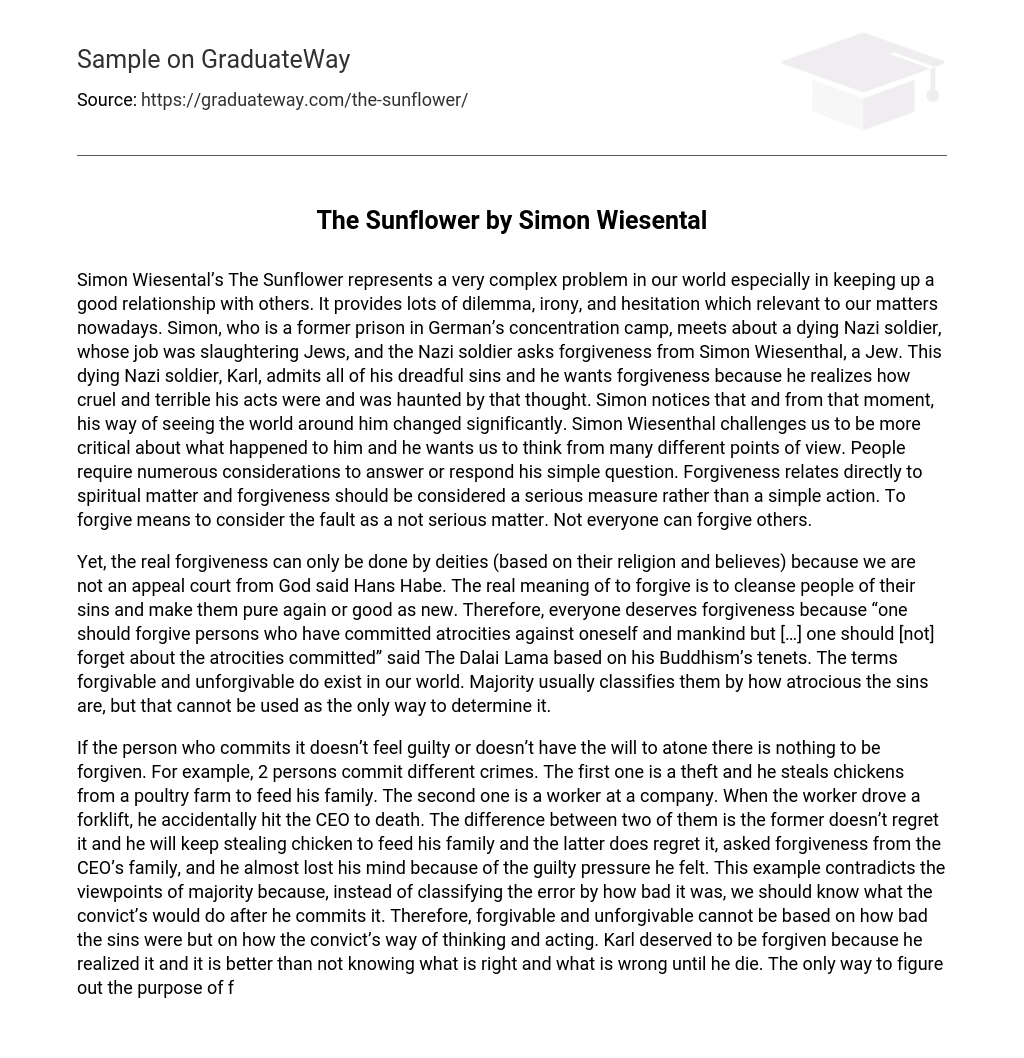Simon Wiesental’s The Sunflower represents a very complex problem in our world especially in keeping up a good relationship with others. It provides lots of dilemma, irony, and hesitation which relevant to our matters nowadays. Simon, who is a former prison in German’s concentration camp, meets about a dying Nazi soldier, whose job was slaughtering Jews, and the Nazi soldier asks forgiveness from Simon Wiesenthal, a Jew. This dying Nazi soldier, Karl, admits all of his dreadful sins and he wants forgiveness because he realizes how cruel and terrible his acts were and was haunted by that thought. Simon notices that and from that moment, his way of seeing the world around him changed significantly. Simon Wiesenthal challenges us to be more critical about what happened to him and he wants us to think from many different points of view. People require numerous considerations to answer or respond his simple question. Forgiveness relates directly to spiritual matter and forgiveness should be considered a serious measure rather than a simple action. To forgive means to consider the fault as a not serious matter. Not everyone can forgive others.
Yet, the real forgiveness can only be done by deities (based on their religion and believes) because we are not an appeal court from God said Hans Habe. The real meaning of to forgive is to cleanse people of their sins and make them pure again or good as new. Therefore, everyone deserves forgiveness because “one should forgive persons who have committed atrocities against oneself and mankind but […] one should [not] forget about the atrocities committed” said The Dalai Lama based on his Buddhism’s tenets. The terms forgivable and unforgivable do exist in our world. Majority usually classifies them by how atrocious the sins are, but that cannot be used as the only way to determine it.
If the person who commits it doesn’t feel guilty or doesn’t have the will to atone there is nothing to be forgiven. For example, 2 persons commit different crimes. The first one is a theft and he steals chickens from a poultry farm to feed his family. The second one is a worker at a company. When the worker drove a forklift, he accidentally hit the CEO to death. The difference between two of them is the former doesn’t regret it and he will keep stealing chicken to feed his family and the latter does regret it, asked forgiveness from the CEO’s family, and he almost lost his mind because of the guilty pressure he felt. This example contradicts the viewpoints of majority because, instead of classifying the error by how bad it was, we should know what the convict’s would do after he commits it. Therefore, forgivable and unforgivable cannot be based on how bad the sins were but on how the convict’s way of thinking and acting. Karl deserved to be forgiven because he realized it and it is better than not knowing what is right and what is wrong until he die. The only way to figure out the purpose of forgiveness can only be seen through spiritual aspect.
People ask forgiveness not because they really need the other to forgive them, but, they ask it to make them easier to forgive themselves. They have to “spit it all out” or confess in order to lighten the load from their mind. Just like Karl in The Sunflower, he needs to confess all of his sins to ease his tortured mind. Even though Simon doesn’t answer Karl, he should have felt a lot better after confessing his entire burden and because he knows that Simon understands his predicament. Forgiveness is a very unique and common way to help people, yet, it is not that substantial either. Forgiveness does contribute in helping people recovering from their spiritual issue but in the end, the capability of forgiveness is limited by its true meaning.
Works Cited
Wiesenthal, Simon. The Sunflower. New York: Schoken, 1998. Print. The Dalai Lama. In Wiesenthal, 129-130.
Habe, Hans. In Wiesenthal, 158-163.





